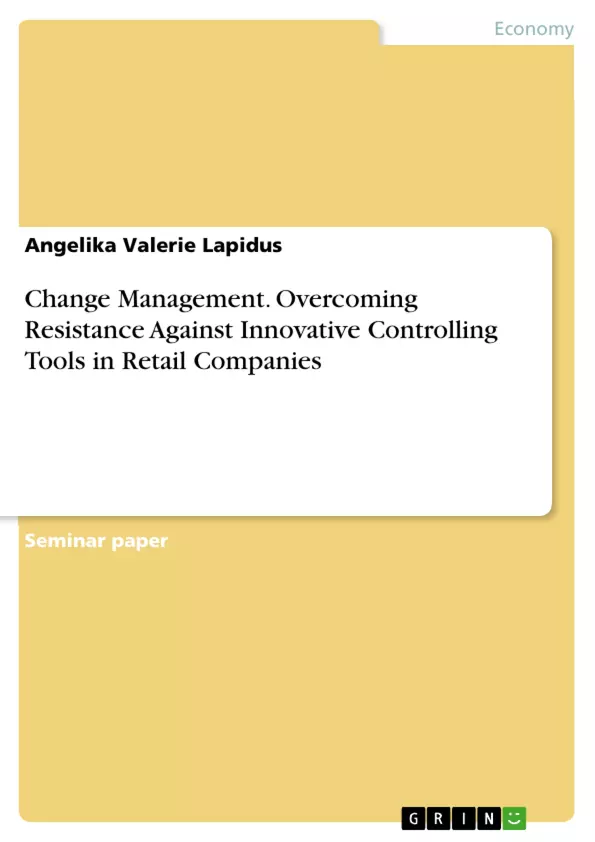The following paper aims to show the origin of resistance resulting from changing old controlling tools to more innovative ones in retail companies. Furthermore there will be strategies presented to avoid and overcome such resistances. For this purpose, typical situations as well as exemplary solutions for dealing with resistances in practice are outlined within a theoretical framework. Highly relevant for companies of all sizes and industries, this topic is of particular importance for retail companies. This results mainly from the conservative corporate culture, the high margin pressure and the associated risk aversion in retail companies.
Successful and future-oriented corporate management is based on efficient and effective controlling tools that form a holistic system. Its purpose is satisfying internal and external information needs as well as providing a mandatory base for the management of a company with which decisions can be made at all times. The demands for modern controlling tools are very diverse. Factors crucial to the success of a company must always be depicted in a consistent manner and controlling-relevant financial as well as non-financial information must be presented transparently and in a recipient-oriented fashion. At the same time, past and future-oriented assertions must be made that provide a reliable idea of the current situation of a company. A company's controlling tools should meet the expectations of externs. The greatest challenges here include regulatory and legal requirements as well as implicit expectations of the capital markets with regard to transparency and quality of the tools used. This applies in particular to innovative forms of financing, which are also becoming popular in the retail sector.
Inhaltsverzeichnis (Table of Contents)
- Introduction
- Topic Background
- Thesis Structure
- Theoretical Framework: Change Management
- Definition
- Causes and Reasons for Change
- Fundamental Prerequisites
- Lewin's Change Model
- Overcoming Resistance
- Forms of Resistance
- Causes and Reasons for Resistance
- The Change Curve
- Change of Controlling Tools in a Retail Company
- Triggers of Change
- Participants in the Change Process
- Resistance to Change
- Strategies for Avoiding and Overcoming Resistance
- Conclusion
Zielsetzung und Themenschwerpunkte (Objectives and Key Themes)
This work aims to explore the challenges of implementing innovative controlling tools within retail companies and identify effective strategies for overcoming resistance to change. The focus is on understanding the theoretical framework of change management, analyzing the causes and forms of resistance, and proposing practical solutions for successful implementation.
- Change Management in Retail Companies
- Resistance to Change
- Strategies for Overcoming Resistance
- Innovative Controlling Tools
- Successful Implementation of Change
Zusammenfassung der Kapitel (Chapter Summaries)
The first chapter introduces the topic background and outlines the structure of the thesis. Chapter two delves into the theoretical framework of change management, defining its key elements and exploring the causes and reasons for change. Chapter three examines the concept of resistance to change, focusing on its forms, causes, and the impact of the change curve. The fourth chapter investigates the specific context of changing controlling tools within a retail company, analyzing the triggers of change, the participants involved, the resistance encountered, and various strategies for overcoming it.
Schlüsselwörter (Keywords)
This work focuses on the key concepts of change management, resistance to change, innovative controlling tools, retail companies, and successful implementation strategies. It explores the theoretical framework of change management, analyzes the causes and forms of resistance, and proposes practical solutions for overcoming resistance to change in the context of introducing new controlling tools within a retail setting.
Frequently Asked Questions
Why is change management important for retail companies?
Retail companies often have conservative cultures and high margin pressure, making them risk-averse. Change management helps them adopt innovative tools to stay competitive.
What causes resistance to new controlling tools?
Resistance can stem from fear of the unknown, increased transparency, perceived loss of control, or a lack of understanding of the benefits.
What is Lewin's Change Model?
It is a theoretical framework consisting of three stages: Unfreezing (preparing for change), Changing (transitioning), and Refreezing (stabilizing the new state).
How can companies overcome resistance?
Strategies include clear communication, involving employees in the process, providing training, and demonstrating the value of the new tools.
What is the "Change Curve"?
The change curve describes the emotional stages individuals go through during a transition, from shock and denial to exploration and eventual commitment.
- Quote paper
- Angelika Valerie Lapidus (Author), 2021, Change Management. Overcoming Resistance Against Innovative Controlling Tools in Retail Companies, Munich, GRIN Verlag, https://www.hausarbeiten.de/document/1243351


